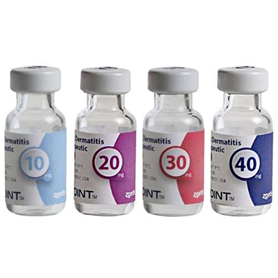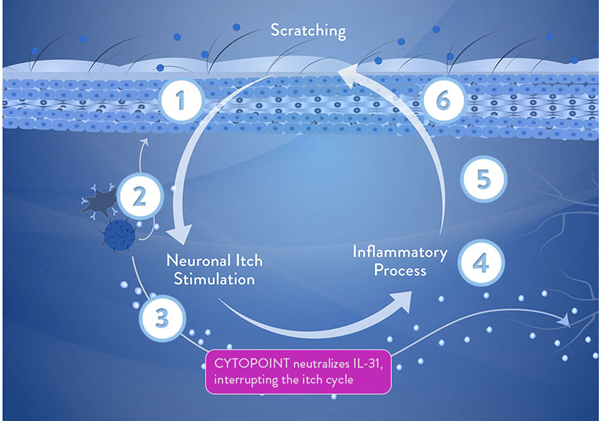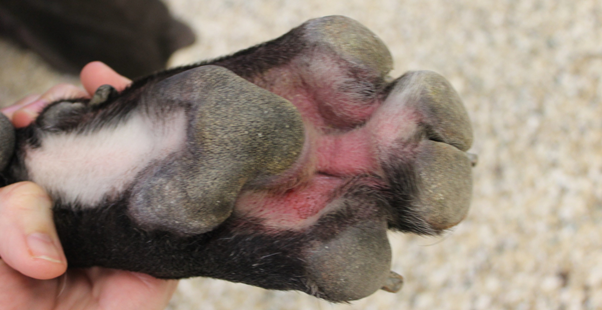 At the end of a cold winter, Spring is such a welcome season. Full of warmth, new life, birds singing, flowers blooming and grass growing. You start to feel alive again after hibernating all winter. That is unless you suffer from allergies! For these poor guys and girls Spring means rashes, hives, weeping and scabby sores and being itchy… itchy eyes, ears, nose, feet… itchy everything!!
At the end of a cold winter, Spring is such a welcome season. Full of warmth, new life, birds singing, flowers blooming and grass growing. You start to feel alive again after hibernating all winter. That is unless you suffer from allergies! For these poor guys and girls Spring means rashes, hives, weeping and scabby sores and being itchy… itchy eyes, ears, nose, feet… itchy everything!!
 When your dog has sore, itchy or infected skin the best place for us to start determining the cause is with a thorough history to try and find reasons for the itch. We will then carry out a full physical exam, assess samples from the ears and skin under the microscope and maybe run some blood tests. We will want to rule out parasites and endocrine diseases such as a low thyroid production or Cushing’s disease. We will also be carefully assessing the distribution of the itchy areas on the body as this can give us clues as to whether your pet has a contact allergy, a food allergy, a pollen and grass allergy or a combination of them all. We will also be wanting to assess if there are any secondary infections present which can make your pet even itchier.
When your dog has sore, itchy or infected skin the best place for us to start determining the cause is with a thorough history to try and find reasons for the itch. We will then carry out a full physical exam, assess samples from the ears and skin under the microscope and maybe run some blood tests. We will want to rule out parasites and endocrine diseases such as a low thyroid production or Cushing’s disease. We will also be carefully assessing the distribution of the itchy areas on the body as this can give us clues as to whether your pet has a contact allergy, a food allergy, a pollen and grass allergy or a combination of them all. We will also be wanting to assess if there are any secondary infections present which can make your pet even itchier.
Once a diagnosis has been made the next step is deciding how best to tackle it. We like to start with the things that are controllable, such as diet and parasite control.
Anything that causes inflammation to the skin will in turn damage the skin as a barrier which then allows secondary infections and/or parasites to take hold. These secondary infections are things we can treat with antibiotics, antibiotic shampoos (malaseb shampoo and pyohex conditioner) and topical ear ointments. Parasites can also be treated with oral chews or topical top spots. Treating the infections will temporarily provide your pet with some relief, but without managing the underlying cause for them these infections will be back.
In most cases allergies aren’t things we can cure but things we can either avoid or manage. Whilst your pet is in contact with their allergen their skin will continue to be inflamed, itchy and at risk of secondary infection. Remember ears are still skin! Just in a warm, moist environment perfect for infection to grow. All our treatments are there to help manage the secondary symptoms which is why for some animals they are needed daily all year round and for others it might be more seasonal.
In recent years there have been some fantastic developments in allergy management! Where once a vet’s only option was to send your little one home on a course of steroids they can now tailor the plan to your pets specific issues and offer up some options that have far fewer side effects and allow better long term health.
 For a lot of pets their only bother might be itchy paws or a rash in their armpits which keep them up all night licking and chewing. For these guys being on a long-term oral medication might not be ideal due to health impacts on other body systems and costs. In these cases a topical steroid spray applied once daily to the affected area called Cortavance can be an excellent solution. Normally coupled with regular malaseb bathing to reduce secondary infections, the Cortavance spray can be sprayed as and when it is needed. Being a topical agent the steroid is minimally absorbed systemically having no further health impacts.
For a lot of pets their only bother might be itchy paws or a rash in their armpits which keep them up all night licking and chewing. For these guys being on a long-term oral medication might not be ideal due to health impacts on other body systems and costs. In these cases a topical steroid spray applied once daily to the affected area called Cortavance can be an excellent solution. Normally coupled with regular malaseb bathing to reduce secondary infections, the Cortavance spray can be sprayed as and when it is needed. Being a topical agent the steroid is minimally absorbed systemically having no further health impacts.
For those poor dogs who suffer from Atopy, a more systemic approach is needed. Atopy or Atopic dermatitis is a genetic predisposed hypersensitivity reaction to a combination of quite common normally harmless environmental allergens. Pollens, grasses, dust mites and mould spores are among the most common. Exposure can occur through inhalation or via physical contact to air borne particles. Traditionally oral steroids were used for these patients which worked well to control the inflammation, but often left the animals lethargic, panting, overly hungry and overly thirsty. We know with time long term steroid use leads to increased risks for pancreatitis, diabetes, liver disease and heart disease.
 One of the newer alternatives is Apoquel (active ingredient oclacitinib). This tablet blocks the actions of cytokines which cause inflammation and itching. By only targeting the allergy pathways they avoid causing any other side effects seen with steroids who block the whole inflammatory chain. Once started, relief can be seen in as little as 4 hours and allergic itch is controlled within 24 hours. Apoquel is generally given orally twice a day for the first 14 days and then reduced to once daily. The beauty of this medication is that it does not need to be weaned off and can be stopped and started as needed, although for many the best results are seen with long term once daily low dosing to manage the atopy symptoms. Apoquel is also very beneficial to senior patients who may also need nonsteroid anti-inflammatories to manage osteoarthritis (which cannot be used in conjunction with steroids) or may have cardiac disease which steroids will worsen.
One of the newer alternatives is Apoquel (active ingredient oclacitinib). This tablet blocks the actions of cytokines which cause inflammation and itching. By only targeting the allergy pathways they avoid causing any other side effects seen with steroids who block the whole inflammatory chain. Once started, relief can be seen in as little as 4 hours and allergic itch is controlled within 24 hours. Apoquel is generally given orally twice a day for the first 14 days and then reduced to once daily. The beauty of this medication is that it does not need to be weaned off and can be stopped and started as needed, although for many the best results are seen with long term once daily low dosing to manage the atopy symptoms. Apoquel is also very beneficial to senior patients who may also need nonsteroid anti-inflammatories to manage osteoarthritis (which cannot be used in conjunction with steroids) or may have cardiac disease which steroids will worsen.
 For those Atopic patients who don’t tolerate daily tableting or haven’t seen the desired anti-itch effect from the Apoquel a monthly injection is now available called Cytopoint. Cytopoint is even more atopy specific in that it only blocks one allergy pathway (interleukin 31). By being so specific in its action it has been shown to give dogs significant itch relief within 24hrs and is designed to work for up to 4-8 weeks.
For those Atopic patients who don’t tolerate daily tableting or haven’t seen the desired anti-itch effect from the Apoquel a monthly injection is now available called Cytopoint. Cytopoint is even more atopy specific in that it only blocks one allergy pathway (interleukin 31). By being so specific in its action it has been shown to give dogs significant itch relief within 24hrs and is designed to work for up to 4-8 weeks.

It has been shown to improve patient comfort with every injection; 65% of patients were successfully managed on the 1st injection, 85% after the 2nd injection and 93% by the 3rd injection in one study. By being injectable it reduces a lot of stress for families of giving daily medications and improves patient quality of life, it also has no known drug interactions and so is safe to be used with all other co morbidities.

The latest development in food support is Hills Derm Complete. This diet is designed to be a hypoallergenic diet which is suitable for both food allergy patients and atopic patients alike. We know that food allergy patients are 20-30% more likely to have other concurrent allergies. In a healthy dog the skin acts as a waterproof barrier stopping both moisture/water loss and stopping bacteria from getting in. In Atopic patients they have damage to the lipid layer meaning the barrier is damaged and resulting in increased moisture loss and allowing allergens to get through to the deeper layers of the skin, exposing them to the immune system. Once the allergens are detected this sets off a big histamine and cytokine response resulting in  inflammation and itchiness. So when it comes to treatment, medications help to stop the histamine and cytokine reactions, but food helps to repair the damaged barrier to stop the allergens getting in! In the Hills Derm Complete there is a combination of omega 6, Vitamin A and B complexes and zinc which help to restore the skins barrier function. It also contains Histaguard complex which is a combination of bioactives and phytonutrients which help to dampen the immune response to the environmental allergens. In studies carried out by Hills 82% of environmental allergy patients saw a reduction in inflammation compared with only 62% in the control group (fed another good quality hypoallergenic diet), and 59% of owners reported improved sleep compared with 32% in the control group.
inflammation and itchiness. So when it comes to treatment, medications help to stop the histamine and cytokine reactions, but food helps to repair the damaged barrier to stop the allergens getting in! In the Hills Derm Complete there is a combination of omega 6, Vitamin A and B complexes and zinc which help to restore the skins barrier function. It also contains Histaguard complex which is a combination of bioactives and phytonutrients which help to dampen the immune response to the environmental allergens. In studies carried out by Hills 82% of environmental allergy patients saw a reduction in inflammation compared with only 62% in the control group (fed another good quality hypoallergenic diet), and 59% of owners reported improved sleep compared with 32% in the control group.
Every patient is different and as such every patient’s treatment plan should be tailored to them. It is exciting to see how many more options we can now offer our furry friends that have less side effects and can be more easily administered. If you have a pet who is constantly licking or scratching, come in and see us at McDowall Vets, there are so many ways in which we can help!



